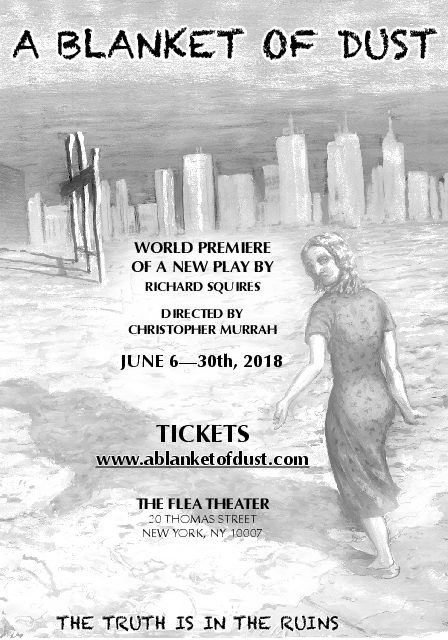A new play will test the receptiveness of the New York stage to the issue of what really happened in Lower Manhattan on September 11, 2001. “A Blanket of Dust,” a political thriller by Richard Squires, debuts Off-Broadway June 6 to 30 at The Flea Theater Mainstage, 20 Thomas Street, just blocks from where the tragic events took place. The play is the fictional story the daughter of a high-ranking US Senator seeking justice for her husband who has died in the World Trade Center.
The woman, named Diana Crane, is like a modern day Antigone–an iconic heroine of Theater of Resistance. She races from Washington, DC to New York to witness the gruesome aftermath of the attacks and stands helplessly in the dust of the fallen buildings to witness the collapse of 7 World Trade Center. Distrustful of the speedily-forming official narrative, she is launched on a hunt for justice that drives her to the outer fringes of society. Having witnessed facts that the government, the media, her family and her countrymen deny, she confronts her doubters with a harrowing act of sacrifice. Her ultimate tragedy is to oppose the lies and the rule of fear in 21st Century America.
Diana is played by Angela Pierce, who heads a cast of twelve. Pierce shared an Obie Award last year with the ensemble of “Oslo” (directed by Bartlett Sher) and played Goneril opposite Kevin Kline’s Lear in “King Lear” at the Public, directed by James Lapine. She has been awarded Best Actress in multiple film festivals.
To playwright Richard Squires, the play is not meant to invoke the events of 9/11, but the larger issues of our era. He reflects, “It doesn’t matter so much whether government colluded on attacks on September 11 or whether they only exploited them opportunistically on September 12. Eighteen years later, when you look back on those events, we had a right wing coup d’etat. It was called a policy coup by General Wesley Clark, who was running for president at the time. We went on a war footing immediately after 9/11 and stayed on it to invade the Middle East, which is what this country has been doing ever since. We have became an overtly military empire governed by an ideological right wing. That is unarguable. If we are going to remain a democracy, then the people have to have some voice in our decisions. That is what this play is about.”
Director Christopher Murrah stresses that classical themes drive the play. He writes, “The origins of western theater are filled with stories of war and murder. Hecuba, Andromache and Antigone have been some of the voices seeking justice and retribution from wayward governments; women whose own clarity of vision, paired with grief, demanded they speak truth to the state. This play is a modern ‘Antigone,’ unapologetically and rightfully presenting itself in a time when to look away from truth is to turn our back on our own fellow citizens.”
The play’s website, with ticketing and info on the production, is: www.ablanketofdust.com.
The story was initially written by Richard Squires as a novel, then as a screenplay. Robert McIlvane, father of a 9/11 victim, has read both the book and the play. In a recent videotaped interview, he declared, “My feelings about 9/11 are in that play–the absolute frustration. We haven’t gotten the truth of what happened and millions of people have died because of that. And that’s the true beauty of A Blanket of Dust.” The play is likely to resonate strongly with many other New Yorkers whose memories of the fated day are still raw because of its unanswered questions.
The production comes to New York in a time when, with authoritarianism growing the world over, plays of resistance feel urgent and immediate. In modern times, the Antigone myth has been used by dramatists to represent the struggle of the individual citizen against the authoritarian rule of the State. Two modern classics, direct adaptations of Sophocles’ play, are the most familiar. Anouilh famously wrote his “Antigone” during the Nazi occupation of France. Brecht, building on Hölderlin’s verse translation, set the play in Berlin in 1945.
– Jonathan Slaff
